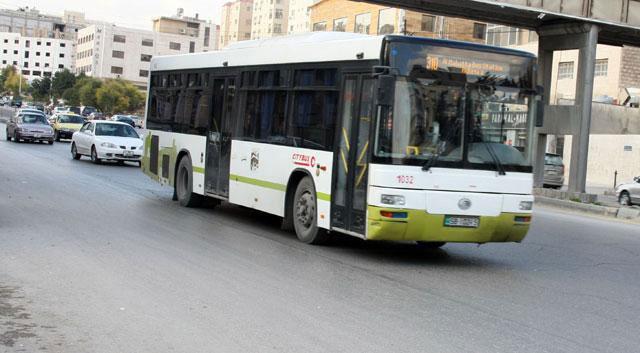Record added successfully



Seventy of the 135 new buses scheduled to start operating by the beginning of 2018 in Amman have arrived in Jordan, Amman’s Mayor Yousef Shawarbeh announced on Saturday.
The buses, which are said to be the “latest and most modern” models, are part of the Greater Amman Municipality’s (GAM) plan to upgrade Jordan’s transport system to the “latest global standards”, as stated by GAM’s spokesperson, Mazen Farajeen.
Abdelraheem Wreikat, executive manager of GAM’s Public Transport Department, stressed that the main reason for the city’s traffic is “the abundance of private cars"
According to studies conducted by the municipality, the average passenger for each car is 1.25, meaning that every four cars carry five passengers.
The new buses, however, have the capacity of more than 60 passengers.
“If we build a public transport system that the citizens can trust, that means that each bus will result in the roads being spared by 12 cars,” he told The Jordan Times.
Experts have agreed that the problem remains that citizens do not rely enough on the public transport system to give up their cars.
“The citizens would rather use their cars over public buses because they find comfort in knowing for sure that they will get to their destination on time. With public transport, you never know when the bus will arrive or if you’ll find one that is heading to your destination,” said Mohammed Dawoud, a civil engineer in the Jordanian Engineers’ Association (JEA).
Sari Zeiter, the deputy manager for Civil Engineers’ Committee in the JEA, noted that it seems “illogical” to bring in 286 buses when the Bus Rapid Transit (BRT) is not done yet. “How can we operate these buses in the already-crowded roads without sufficient infrastructure? Technically speaking, this will increase traffic,” he told The Jordan Times.
GAM’s project is scheduled to have 286 new buses operating by the end of 2020, in line with BRT’s expected launch.
For Zeiter, the municipality should wait until the BRT project is done, while working to promote the new public transport system to citizens.
Wreikat, however, said he feels "hopeful” despite the current transport problems in Jordan, stressing that he believes citizens will eventually trust the new system because “it will prove to be more efficient than their cars”.
“If the fare is cheap, the seats are comfortable and timing is reliable, why would citizens not use public transport and spare themselves the trouble of traffic, parking, and gas?”, he concluded